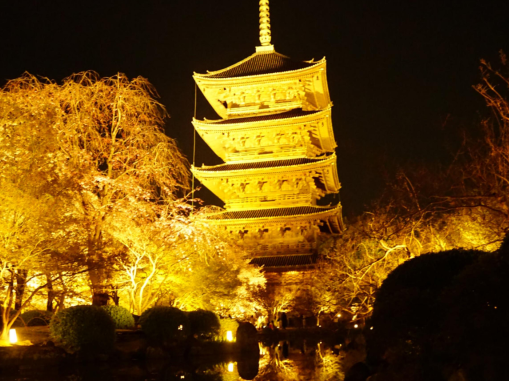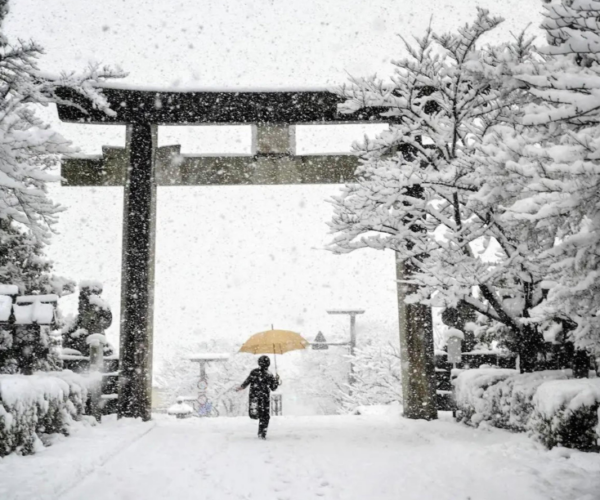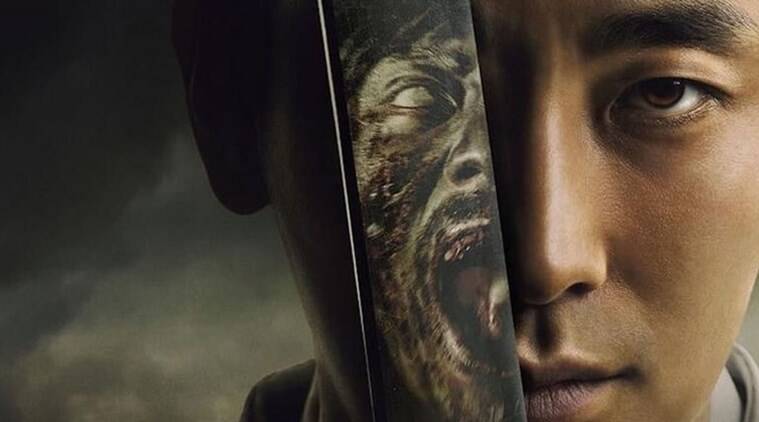This article originally featured in the March 2022 issue of Connect.
Fergus Gregg (Kobe)
The Zombie Genre. An unapologetically bloated franchise that, much like its namesake, refuses to die. While in recent years public reception of Western zombie movies has been tepid, South Korean zombie cinema has exploded onto the scene with the extreme velocity of one of East Asia’s high-speed rail networks and successfully revived the failing subgenre.
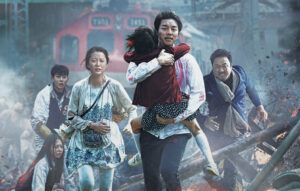 So let’s talk about the starting point for all of this. While it’s generally acknowledged that The Last Man on Earth (1964) was a precursor to the sub-genre and its elements, it is no secret that George Romero (The Godfather of Zombies) perfected these elements and cemented zombies as an essential subgenre among horror cinema. However, Romero’s slow moving zombies have since been eclipsed by the fast moving undead first introduced by Danny Boyle’s28 Days Later and woven into Romero’s legacy by Zack Snyder in 2004’s Dawn of the Dead remake. While Boyle’s “infected” served the narrative by reinforcing the antagonist’s villainous rhetoric and the greater moral questions that the plot proposed, Snyder’s interpretation took a far more simplistic approach. Yet, in an almost Darwinian set of circumstances, Snyder’s new form of zombies, derived from Boyle’s, have dominated pop-culture for the better half of a decade, with The Walking Dead being one of the few hold outs of Romero’s legacy.
So let’s talk about the starting point for all of this. While it’s generally acknowledged that The Last Man on Earth (1964) was a precursor to the sub-genre and its elements, it is no secret that George Romero (The Godfather of Zombies) perfected these elements and cemented zombies as an essential subgenre among horror cinema. However, Romero’s slow moving zombies have since been eclipsed by the fast moving undead first introduced by Danny Boyle’s28 Days Later and woven into Romero’s legacy by Zack Snyder in 2004’s Dawn of the Dead remake. While Boyle’s “infected” served the narrative by reinforcing the antagonist’s villainous rhetoric and the greater moral questions that the plot proposed, Snyder’s interpretation took a far more simplistic approach. Yet, in an almost Darwinian set of circumstances, Snyder’s new form of zombies, derived from Boyle’s, have dominated pop-culture for the better half of a decade, with The Walking Dead being one of the few hold outs of Romero’s legacy.
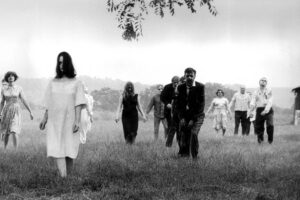
Since 2004, zombie films have either fallen under the definition of “style over substance” Hollywood Blockbusters or works of comedy, with very little changing in the formula and style, barring a few exceptions. Yet where Western zombie cinema has grown stagnant, turning the undead into fodder for schlocky blockbusters starring Brad Pitt, Korean filmmakers did the one thing no one expected—they did something original.
Enter the hero from stage right: Train to Busan. What early 2010s zombie cinema (particularly World War Z) introduced to the formula, Director Yeon Sang-Ho has perfected, creating a satisfying blend of new tropes and elements, while also utilising his movie to shine a light on cultural, social, and class issues in Korean society.
The synopsis is neat and simple. A father, who has become alienated from his family, is forced to take his role as guardian seriously for the first time in years, and while traveling with his young daughter his high speed train to Busan becomes overcrowded with a mass of the bent undead. What this concise summary leaves out is the critique of South Korean classism and the consequences of capitalism that are woven into the narrative inconspicuously yet effectively. So, let’s start with the films depiction of classism, which can be found in the film’s secondary antagonist, Yon Suk.
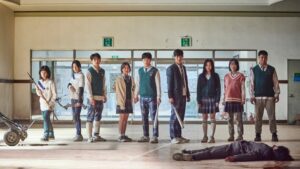 Yon-suk, portrayed by Kim Eui-sung, is a businessman and by and large represents the upper class echelons of South Korean society. He is pragmatic to a fault, distrusting, and overall devalues the lives of those around him, particularly those whom he believes to be of a lower stature to him. He’s self-serving and will sacrifice those around him in order to preserve his own survival and wellness, often to the detriment of other survivors. Here, parallels can be drawn to Romero’s original Night of the Living Dead where the character Harry, frequently put his own family’s well being above the other survivors, used them as tools, and frequently belittled Sam on account of his being an African American and belonging to a social class that Harry perceived as being beneath his own. It is in this correlation of social commentary between Romero’s work and Yeon Sang-ho’s that we can see what contemporary zombie cinema may have been missing: higher ideas and thought-provoking themes. This is echoed in Seo Seok-woo’s (our protagonist and the father to Kim Su-an) personal narrative.
Yon-suk, portrayed by Kim Eui-sung, is a businessman and by and large represents the upper class echelons of South Korean society. He is pragmatic to a fault, distrusting, and overall devalues the lives of those around him, particularly those whom he believes to be of a lower stature to him. He’s self-serving and will sacrifice those around him in order to preserve his own survival and wellness, often to the detriment of other survivors. Here, parallels can be drawn to Romero’s original Night of the Living Dead where the character Harry, frequently put his own family’s well being above the other survivors, used them as tools, and frequently belittled Sam on account of his being an African American and belonging to a social class that Harry perceived as being beneath his own. It is in this correlation of social commentary between Romero’s work and Yeon Sang-ho’s that we can see what contemporary zombie cinema may have been missing: higher ideas and thought-provoking themes. This is echoed in Seo Seok-woo’s (our protagonist and the father to Kim Su-an) personal narrative.
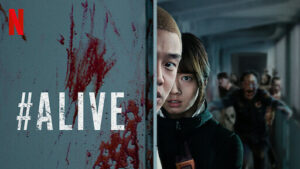 Seok-woo, played by Gong Sook, is portrayed as selfish to a fault initially, this being the catalyst for his marriage failing and his struggle with fatherhood. This character trait goes deeper, as it’s revealed that Seok-woo had ordered the offloading of volatile shares in a chemical waste management company, leading indirectly to initial infection. Throughout the movie we see Seok-woo come into contact with a subordinate of his, who has realised that they were the cause of the disaster, and snubs responsibility. However this further moral burden, coupled with the focus on his relationship with his daughter, makes the subsequent character arc all the more satisfying.
Seok-woo, played by Gong Sook, is portrayed as selfish to a fault initially, this being the catalyst for his marriage failing and his struggle with fatherhood. This character trait goes deeper, as it’s revealed that Seok-woo had ordered the offloading of volatile shares in a chemical waste management company, leading indirectly to initial infection. Throughout the movie we see Seok-woo come into contact with a subordinate of his, who has realised that they were the cause of the disaster, and snubs responsibility. However this further moral burden, coupled with the focus on his relationship with his daughter, makes the subsequent character arc all the more satisfying.
When compared to its contemporaries, Train to Busan succeeds in proving that zombie cinema can still be refreshing to audiences, through its balance of themes and intricate use of the mise-en-scène of a high speed train keeping action from ever feeling stale or repetitive. In the scheme of things, however, Train to Busan was just the beginning.
Next on the list of killer South Korean media, Kingdom is a show that many in the West have slept on, which is a true crime. Set in Korea’s Joseon era, Kingdom is the story of a disinherited Crown Prince fighting against the corruption in his court and a mysterious virus that brings his subjects back from the dead. Screenwriter Kim Eun-hee initially wrote Kingdom as a webcomic in 2011 and had little hope that it would be adapted, yet with the success of Train to Busan, suddenly there was new interest in the zombie genre.
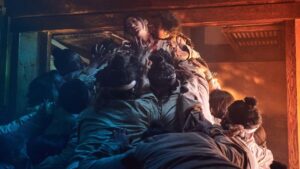
Kingdom proves that Train to Busan was not a fluke in terms of the utilisation of the zombie genre as a capable method of addressing social issues. Kim Eun-hee’s primary intention was to write a story that can encapsulate today’s problems in a Joseon setting, with a focus on hunger and blood as primary themes. Hunger as a theme refers to the extreme gap between the Yangban (ruling class) and poverty stricken underclass. Food is often referred to and used as a motivator in Kingdom and there’s a stark juxtaposition between how aristocratic characters treat food as an amenity, whereas the poor know the value of even the most meagre staples. This disparity is then further reinforced as the aristocrats are devoured by the peasants that they previously looked down upon. All of this draws a contrast between the Modern wealth of South Korea, that has been referred to as the contemporary aristocracy. Overall, Kingdom tries to discuss the growing wealth disparity that is present in South Korea and the emergence of the new upper class in the form of the corporate dynasties of modern day South Korea.
Supplementing Train to Busan and Kingdom is the movie #Alive and the recently released series All of Us Are Dead. These two tackle social isolation and the pressures put upon adolescents by class structure, the education system and puberty in general. While overall I personally found both of them to be weaker stories than Train to Busan and Kingdom , they manage to communicate familiar zombie themes such as adolescence and loneliness, in new and insightful ways and further cement Korea’s dominance in new zombie cinema.
So while the West putters on with more The Walking Dead spin-off series’, and the odd gem such as The Girl with All the Gifts, it would appear that the future of the zombie genre in the global zeitgeist is in the hands of the bone-snapping, jaw-jabbering and veins-blackening zombies of South Korea.
If you’re a zombie enthusiast like me, I highly recommend checking out each of these pieces of media. With so much choice right now, there should be at least one that resonates with you.
Fergus is a youthful first-year JET who has stepped into Japan bright-eyed and looking for adventure. When not obsessing over horror films and literature, he can be found exploring Hyogo in search of mystery.
